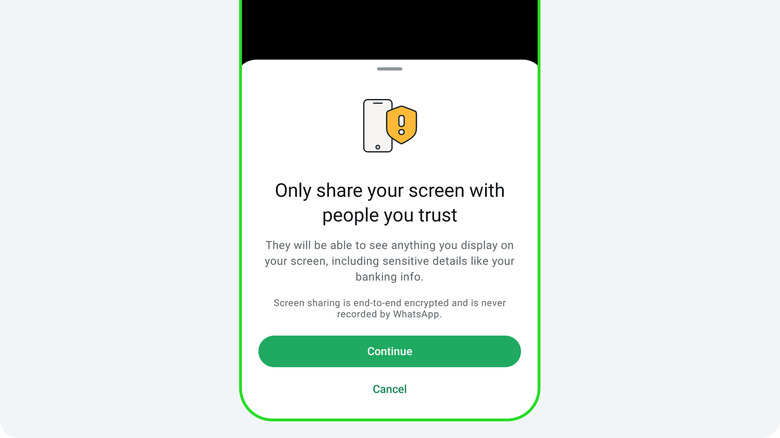WhatsApp Rolls Out A New Feature To Protect Users From Online Scams
Meta today announced several new security features designed to help users better identify online scams. Meta's new tools are incredibly important because as users get better at recognizing common scam techniques, scammers quickly adapt by devising new schemes.
Regarding WhatsApp, Meta announced that it will now issue a security warning whenever a user is prompted to share their screen with an unknown contact. This is meant to combat a common scam where users are led to believe that there's an issue with either their device or financial institution. In turn, scammers kindly offer to share a user's screen so that they can better ascertain what's going on and ultimately fix the made-up issue. Of course, with screen sharing enabled, scammers can view typed passwords and sensitive financial information in real-time.
Because scams of this nature typically target older individuals, Meta said that it's joining the National Elder Fraud Coordination Center (NEFCC), a non-profit "that brings together law enforcement, and companies like AARP, Amazon, Capital One, Google, Microsoft, and Walmart to combat fraud targeting older adults."
Messenger is also getting stronger scam detection
Though not available to all users just yet, Meta said that Messenger is currently testing improved scam detection software. Scams over Messenger can be especially insidious because many scammers will construct a seemingly regular Facebook profile and then send out a large number of friend requests to strangers. Like most scams, the underlying strategy here is that a small percentage of users will blindly accept friend requests from almost anybody. And once a scammer gets one person to accept a friend request, subsequent friend requests within that friend's social network will now display a "mutual friend", which makes the scammer's profile and subsequent friend requests seem inherently legitimate. Once a friend request is approved, the scammer will then send a scam message via Messenger.
In light of the above, a future version of Messenger will be able to detect suspicious messages and then ask users if they want to send the message for an AI review. Some common scams Messenger looks for include job offers, crypto solicitations, and lucrative work from home opportunities. Notably, these types of scams are also quite prevalent via SMS.
Speaking to the sheer volume of scams Meta has to contend with, the company said that during the first six months of 2025 alone, it "detected and disrupted about 8 million accounts associated with scam centers across Myanmar, Laos, Cambodia, the United Arab Emirates, and the Philippines." What's more, the company also said it identified and removed more than 21,000 Facebook Pages which were masquerading as legitimate customer support pages from real companies.

